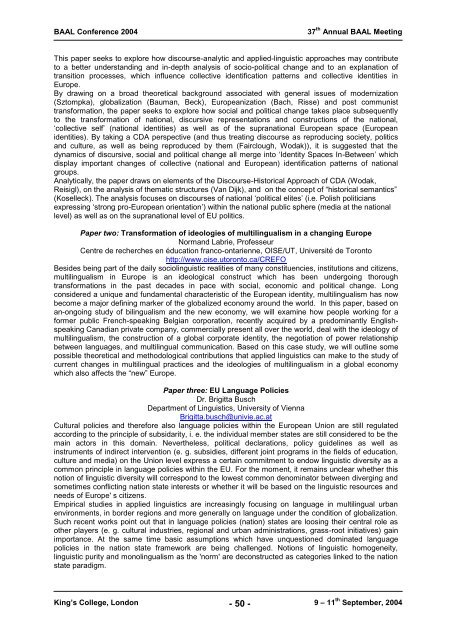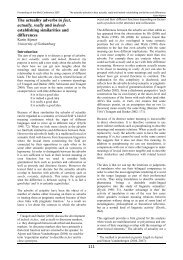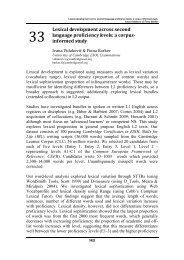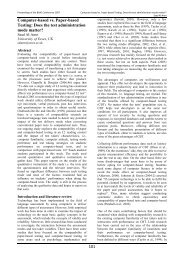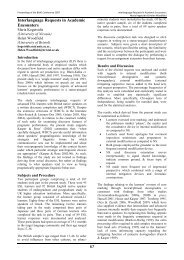Colloquia - British Association for Applied Linguistics
Colloquia - British Association for Applied Linguistics
Colloquia - British Association for Applied Linguistics
You also want an ePaper? Increase the reach of your titles
YUMPU automatically turns print PDFs into web optimized ePapers that Google loves.
BAAL Conference 2004 37 th Annual BAAL Meeting<br />
This paper seeks to explore how discourse-analytic and applied-linguistic approaches may contribute<br />
to a better understanding and in-depth analysis of socio-political change and to an explanation of<br />
transition processes, which influence collective identification patterns and collective identities in<br />
Europe.<br />
By drawing on a broad theoretical background associated with general issues of modernization<br />
(Sztompka), globalization (Bauman, Beck), Europeanization (Bach, Risse) and post communist<br />
trans<strong>for</strong>mation, the paper seeks to explore how social and political change takes place subsequently<br />
to the trans<strong>for</strong>mation of national, discursive representations and constructions of the national,<br />
„collective self‟ (national identities) as well as of the supranational European space (European<br />
identities). By taking a CDA perspective (and thus treating discourse as reproducing society, politics<br />
and culture, as well as being reproduced by them (Fairclough, Wodak)), it is suggested that the<br />
dynamics of discursive, social and political change all merge into „Identity Spaces In-Between‟ which<br />
display important changes of collective (national and European) identification patterns of national<br />
groups.<br />
Analytically, the paper draws on elements of the Discourse-Historical Approach of CDA (Wodak,<br />
Reisigl), on the analysis of thematic structures (Van Dijk), and on the concept of “historical semantics”<br />
(Koselleck). The analysis focuses on discourses of national „political elites‟ (i.e. Polish politicians<br />
expressing „strong pro-European orientation‟) within the national public sphere (media at the national<br />
level) as well as on the supranational level of EU politics.<br />
Paper two: Trans<strong>for</strong>mation of ideologies of multilingualism in a changing Europe<br />
Normand Labrie, Professeur<br />
Centre de recherches en éducation franco-ontarienne, OISE/UT, Université de Toronto<br />
http://www.oise.utoronto.ca/CREFO<br />
Besides being part of the daily sociolinguistic realities of many constituencies, institutions and citizens,<br />
multilingualism in Europe is an ideological construct which has been undergoing thorough<br />
trans<strong>for</strong>mations in the past decades in pace with social, economic and political change. Long<br />
considered a unique and fundamental characteristic of the European identity, multilingualism has now<br />
become a major defining marker of the globalized economy around the world. In this paper, based on<br />
an-ongoing study of bilingualism and the new economy, we will examine how people working <strong>for</strong> a<br />
<strong>for</strong>mer public French-speaking Belgian corporation, recently acquired by a predominantly Englishspeaking<br />
Canadian private company, commercially present all over the world, deal with the ideology of<br />
multilingualism, the construction of a global corporate identity, the negotiation of power relationship<br />
between languages, and multilingual communication. Based on this case study, we will outline some<br />
possible theoretical and methodological contributions that applied linguistics can make to the study of<br />
current changes in multilingual practices and the ideologies of multilingualism in a global economy<br />
which also affects the “new” Europe.<br />
Paper three: EU Language Policies<br />
Dr. Brigitta Busch<br />
Department of <strong>Linguistics</strong>, University of Vienna<br />
Brigitta.busch@univie.ac.at<br />
Cultural policies and there<strong>for</strong>e also language policies within the European Union are still regulated<br />
according to the principle of subsidarity, i. e. the individual member states are still considered to be the<br />
main actors in this domain. Nevertheless, political declarations, policy guidelines as well as<br />
instruments of indirect intervention (e. g. subsidies, different joint programs in the fields of education,<br />
culture and media) on the Union level express a certain commitment to endow linguistic diversity as a<br />
common principle in language policies within the EU. For the moment, it remains unclear whether this<br />
notion of linguistic diversity will correspond to the lowest common denominator between diverging and<br />
sometimes conflicting nation state interests or whether it will be based on the linguistic resources and<br />
needs of Europe' s citizens.<br />
Empirical studies in applied linguistics are increasingly focusing on language in multilingual urban<br />
environments, in border regions and more generally on language under the condition of globalization.<br />
Such recent works point out that in language policies (nation) states are loosing their central role as<br />
other players (e. g. cultural industries, regional and urban administrations, grass-root initiatives) gain<br />
importance. At the same time basic assumptions which have unquestioned dominated language<br />
policies in the nation state framework are being challenged. Notions of linguistic homogeneity,<br />
linguistic purity and monolingualism as the 'norm' are deconstructed as categories linked to the nation<br />
state paradigm.<br />
King‟s College, London 9 – 11 th - 50 -<br />
September, 2004


